US Secretary Of State Discusses Iran With Saudi Counterpart
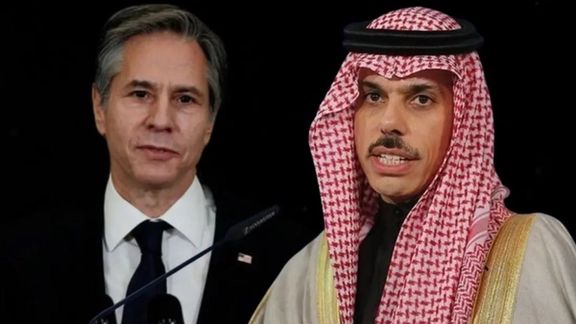
US Secretary of State Antony Blinken and Saudi Foreign Minister Prince Faisal bin Farhan Al Saud discussed Iran's nuclear program and its destabilizing activities across the Middle East.

US Secretary of State Antony Blinken and Saudi Foreign Minister Prince Faisal bin Farhan Al Saud discussed Iran's nuclear program and its destabilizing activities across the Middle East.
The US Embassy in Saudi Arabia tweeted on Tuesday that Blinken and Prince Faisal bin Farhan discussed the challenge posed by Iran’s nuclear program and its destabilizing behavior in the region, and opportunities for greater cooperation on regional issues.
Blinken also underscored the importance of international support for Ukraine as it defends its sovereignty and territorial integrity, stressing the need for a global response to the food security crisis resulting from the Russian invasion of the country.
Relations between Washington and Riyadh have been relatively cool since President Joe Biden took office because of several policies he adopted, including his decision to revive the 2015 nuclear deal with Iran and less military support for Saudi Arabia.
On Monday, Blinken condemned the "unjustified seizure" of two Greek-flagged vessels by Iran's Revolutionary Guard, saying "Iran's continued harassment of vessels and interference with navigational rights and freedoms are a threat to maritime security and the global economy.”
Iranian forces seized two Greek tankers in the Gulf on Friday, shortly after Tehran warned it would take punitive action against Athens over the confiscation of Iranian oil by the United States from a tanker held off the Greek coast.
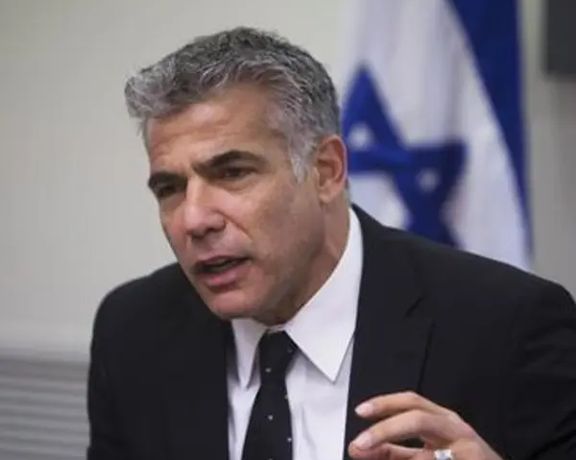
Israeli Foreign Minister Yair Lapid said Monday that Iran must understand that it will pay the price for its terrorist activities and threatening Israelis around the globe.
“The problem with Iran is that it is the number one terrorist propagandist in the world because both Hezbollah and the Islamic Jihad are under its responsibility and threaten Israelis all over the world,” Lapid told Israel’s Army Radio.
Israel's National Security Council also warned its citizens against travel to Turkey Monday, citing Iranian threats of revenge for the assassination last week of Revolutionary Guard colonel Hassan Sayyad-Khodaei.
Tehran has blamed Israel and vowed revenge for the killing of an officer of IRGC’ Quds Force -- responsible for operations outside Iran’s borders -- who was shot dead at the wheel of his car by two people on a motorcycle.
Earlier on Monday, Hossein Salami, the commander of Iran’s Revolutionary Guard, alleged that Israel was behind the assassination, vowing avenge for the assassination.
Iran’s Fars news agency affiliated with the IRGC published an article on Sunday profiling several Israeli businesspeople and implicitly threatening them and their families.
Lapid also said Israel is coordinating with the United States and Persian Gulf States to normalize its relations with Saudi Arabia, adding, “We believe that it is possible to have a normalization process with Saudi Arabia. It’s in our interest.”
Jerusalem and Riyadh have no official diplomatic ties, but relations have warmed in recent years, apparently against Iranian influence in the region.
On Thursday, the head of Knesset’s Foreign Affairs and Defense Committee Ram Ben Barak denied the country took responsibility for Sunday’s killing, following a leak to The New York Times about the assassination.
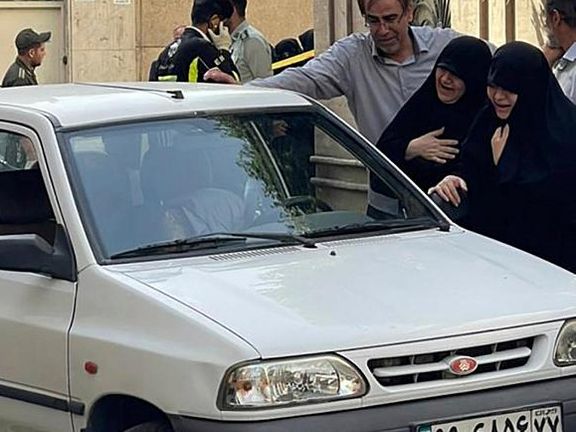
Israel Monday warned its citizens against travel to Turkey, citing Iranian threats of revenge for the assassination last week of a Revolutionary Guard colonel.
Teheran has blamed Israel for the killing of Hassan Sayyad-Khodaei, who was shot dead at the wheel of his car by two people on a motorcycle and has vowed retaliation.
Israel's National Security Council said in a statement that Tehran could be looking to harm Israelis in Turkey and classified it as a "high-risk country."
Iran’s Fars news agency affiliated with the IRGC published an article on Sunday profiling several Israeli businesspeople and implicitly threatening them and their families.
Turkey is a popular tourist destination for Israelis and the two countries have been mending their ties after more than a decade of strained relations. Iranian intelligence has networks operating in Turkey with a history of assassinations and kidnappings of opponent who sought refuge in the neighboring country.
Israel has accused Khodaei of plotting attacks against its citizens worldwide.
Israeli Prime Minister Naftali Bennett's office, which oversees intelligence agency Mossad, has declined to comment on the assassination but Bennett said on Sunday that Teheran would "pay the full price" for instigating attacks on Israelis.
With reporting by Reuters
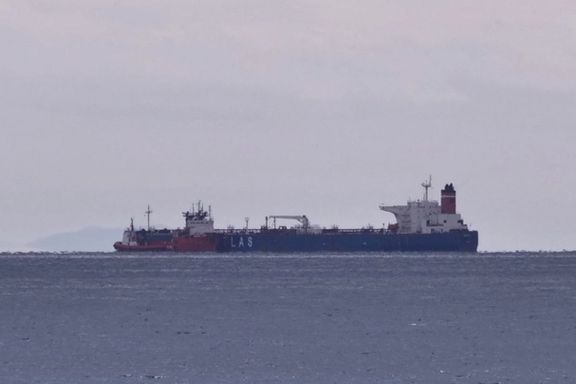
France has denounced Iran's seizure of two Greek-flagged oil tankers in Persian Gulf waters, urging the Islamic Republic “to immediately release the crews and vessels."
In a statement on Sunday, a French foreign ministry spokesperson described the move as "a serious violation of international law."
"France reiterates its commitment to the rules of international law protecting the freedom of navigation and maritime safety. We call on Iran to immediately cease its actions that contravene these rules," the statement added.
The European Union also issued a statement on Sunday to express its serious concern to the Islamic Republic's authorities following the capture of the oil tankers, and called for transparency, de-escalation and a fast resolution of the issue.
Greece has also condemned Tehran's detention of the two ships as "tantamount to acts of piracy" and warned its citizens not to travel to Iran.
On Friday, Iran’s Revolutionary Guard seized the tankers in helicopter-launched raids in the Persian Gulf about a week after the confiscation of Iranian oil from a tanker held off the Greek coast and its transfer to the US.
Iran said on Saturday that the crew of two Greek tankers had not been detained and are on board their vessels.
The Greek tankers are Delta Poseidon and Prudent Warrior, and were captured near Asalouyeh off the coasts of Iran’s Bushehr Province and the Hendurabi island near Bandar Lengeh in Hormozgan province, respectively.
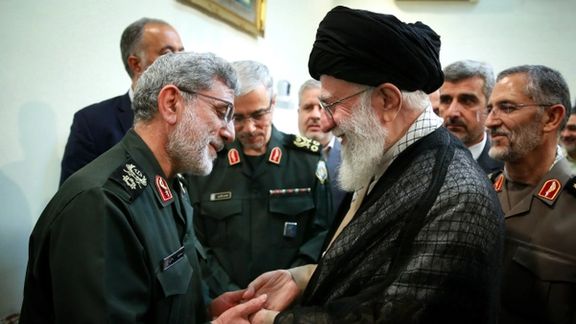
Fars news website in Iran affiliated with the IRGC has published an article profiling several Israeli businesspeople, using thinly veiled threatening language.
The article published on Sunday and credited to the “International Desk” of the website claims it obtained “internal information” about these individuals who are “experts in military, security, cyber and technology fields of the Zionist regime.” The website also claims that the individuals were involved in “sabotage in Islamic countries and assassination of resistance activists.”
The artice is headlined, "Zionists who have to live in hiding".
It goes on to say that “The rest of the information includes very precise details about their family members, photos and videos, home and work addresses, and their commuting routes, as well as telephone numbers…”
However, the information published about each person is very brief and can be easily obtained from public sources.
The first person on the list is retired Major General of the Israeli Defense Forces, Amos Malka (1972-2002), who was director of IDF Intelligence and commander of ground forces during his military career.
Fars used a couple of publicly available photos of Malka, who for the past 20 years has been a successful businessman. He is currently involved with several companies as partner or chairman of the board, including Windare Ventures, Aitech, supplying rugged computer systems, and co-founder of Spire Security Solutions, a security and intelligence company.
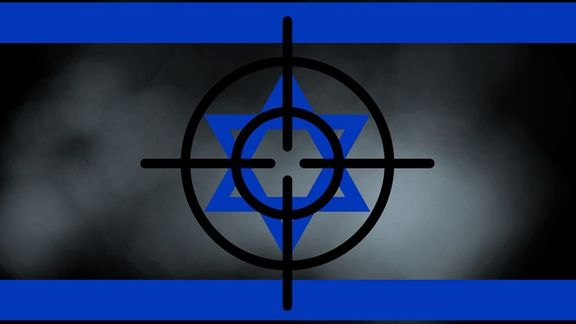
Amir Levinthal is another individual named by Fars, who is the founder of Cylus, a rail cybersecurity company. He is also a former military officer and Fars says he served in IDF intelligence.
The article also profiles Gal Genut, CEO of cyber intelligence company Analiza, who served as director of Unit 8200 of the Israeli Intelligence Corps. Fars says that Genut is also involved in IntSights and says that both companies are contractors for the Israeli government and its intelligence service the Mossad.
Next, the Revolutionary Guard’s mouthpiece profiles Inbal Arieli, as one of 100 most influential persons “in new technologies of the temporary Zionist regime and one of the most well-known Zionist job creators.” It adds that Arieli was also a part of Unit 8200 and “believes that special unit operational tactics should be also used in the business world.”
Amit Meltzer is another Israeli cyber specialist Fars mentions and says he is an expert in cyber defense technologies.
The Fars article comes at a time when the Islamic Republic seems exposed and vulnerable to Israeli operations inside the country. Numerous acts of sabotage and assassination have occurred in Iran since July 2020. Sensitive nuclear, military and economic targets have been hit, although Israel has never confirmed or denied involvement.
The last incident occurred on May 22, when an operative of the Revolutionary Guard Qods (Quds) Force was gunned down outside his home in Tehran in broad daylight. A security source later told Iran International that the IRGC colonel Hssan Sayyad-Khodaei was responsible for recruiting operatives for terror attacks against Israelis.
Iranian officials, shaken by the incident, vowed revenge for the killing as reports said Israel had privately told the United States that it had eliminated the alleged terror organizer.
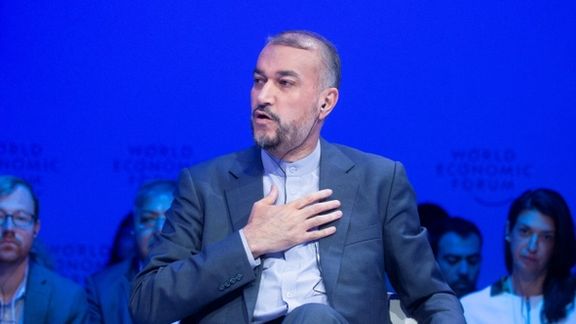
A website in Iran has noted that some remarks by Foreign Minister Hossein Amir-Abdollahian this week in Davos were not statements he would have made in Tehran.
In a commentary entitled "Double Standards," the Iranian Diplomacy website, asked whether the new rhetoric by Amir-Abdollahian about obstacles to the revival of the Iran nuclear deal, was tailored solely for listeners in the annual meeting in Davos or it was the outcome of his experiences as foreign minister during the past 9 months.
Amir-Abdollahian, during a conversation with journalist Farid Zakaria in the annual meeting of the World Economic Forum in Davos, Switzerland on May 26, said that hardliners in both Iran and the United States were working against the revival of the JCPOA. He particularly pointed out opposition by hardliners in the Iranian parliament (Majles).
According to Iran diplomacy, Amir-Abdollahian's statement about the Iranian parliament exerting pressure on the government to reject the JCPOA "could mean that the Iranian foreign Minister has two different views about the same issue." The website asked why he did not say the same thing to Iranian media.
However, neither Amir-Abdollahian nor Zakaria mentioned that hardliners are in control of Iran's negotiating team. Chief negotiator Ali Bagheri-Kani is known for his opposition to the JCPOA since the time he served in the team under ultraconservative negotiator Saeed Jalili in early 2010s. He continued to oppose an agreement with the United States until his appointment as chief negotiator by Iran's new government in 2021.
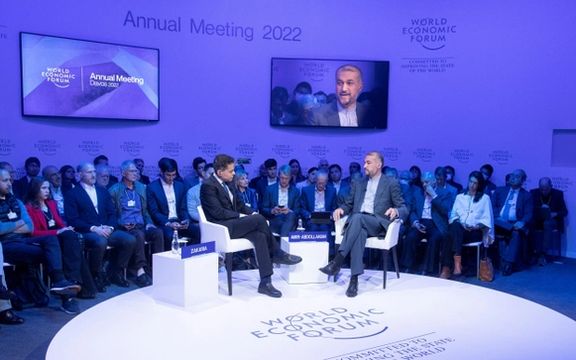
The Iranian foreign minister’s rhetoric about hardliners both in Iran and the United States was also not very different from his predecessor, Javad Zarif’s oft used line of argument, to show that his positions were moderate and those critical of Iran in the West were hardliners.
Meanwhile, the Iranian foreign minister for the first time "strongly condemned the war in Ukraine" without mentioning Russia's role. The Iran diplomacy wrote, "Undoubtedly, the foreign ministry is not courageous enough to make the same statement in Iran." The website also explained that the condemning the war in Ukraine could have been an indirect attack on Russia for its negative role in the talks and taking oil market share from Iran by selling its oil cheaper to China.
However, the website noted that although in many cases, Amir-Abdollahian's statements on Iran's foreign policy followed the party line, in some instances it appeared he got too close to Tehran's red lines.
Amir-Abdollahian, who spoke in Persian throughout the 35-minute conversation looked calmer and on top of the subject matter in most parts of the conversation, unlike his previous international appearances. He sounded like a very good speaker, at least in Persian. His points of weakness were revealed only when he answered questions on relations with Saudi Arabia, which later met with an indirect denial by his Saudi counterpart.
His accusation that the United States did not fight terrorism in Afghanistan and Syria were also not the highlight of this conversation as they were similar to Iranian officials' run-off-the-mill answers to such questions and were devoid of any insight.
Similarly, his statement that "We have intelligence the Zionists have taken US foreign policy hostage," was a repetition of Tehran's ragged argument about the issue throughout the past four decades.